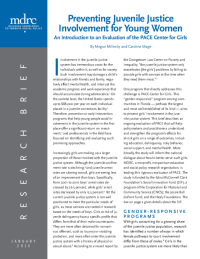Preventing Juvenile Justice Involvement for Young Women
An Introduction to an Evaluation of the PACE Center for Girls

Involvement in the juvenile justice system has tremendous costs for the individuals within it, as well as for society. Such involvement may damage a child’s relationships with friends and family, negatively affect mental health, and interrupt the academic progress and work experience that should accumulate during adolescence. On the societal level, the United States spends up to $88,000 per year on each individual placed in a juvenile corrections facility. Therefore, prevention or early intervention programs that help young people avoid involvement in the juvenile system in the first place offer a significant return on investment, and professionals in the field have focused on identifying and evaluating such promising approaches.
Increasingly, girls are making up a larger proportion of those involved with the juvenile justice system. Although the juvenile confinement rate is declining, and juvenile arrest rates are slowing overall, girls are seeing less of an improvement than boys. Specifically, from 2001 to 2010 boys’ arrest rates decreased by 26.5 percent, while girls’ arrest rates decreased by only 15.5 percent. Yet the current juvenile justice system is not well positioned to meet the particular needs of girls, as most services are rooted in research based on the needs of boys. Girls at risk of juvenile delinquency have a specific profile that differs from that of their male counterparts: They are more often detained for nonserious offenses, such as truancy or violating probation, and more often enter the juvenile justice system with a history of physical or sexual abuse. According to a recent report by the Georgetown Law Center on Poverty and Inequality, “the juvenile justice system only exacerbates [the girls’] problems by failing to provide girls with services at the time when they need them most.”
One program that directly addresses this challenge is PACE Center for Girls. This “gender-responsive” program serving communities in Florida — perhaps the largest and most well-established of its kind — aims to prevent girls’ involvement in the juvenile justice system. This brief describes an ongoing evaluation of PACE that will help policymakers and practitioners understand and strengthen the program’s effects for at-risk girls on a range of outcomes, including education, delinquency, risky behavior, social support, and mental health. More broadly, the study will inform the national dialogue about how to better serve such girls. MDRC, a nonprofit, nonpartisan education and social policy research organization, is leading this rigorous evaluation of PACE. The study is funded by the Edna McConnell Clark Foundation’s Social Innovation Fund (SIF), a program of the Corporation for National and Community Service (CNCS); the Jessie Ball duPont Fund; and the Healy Foundation.






